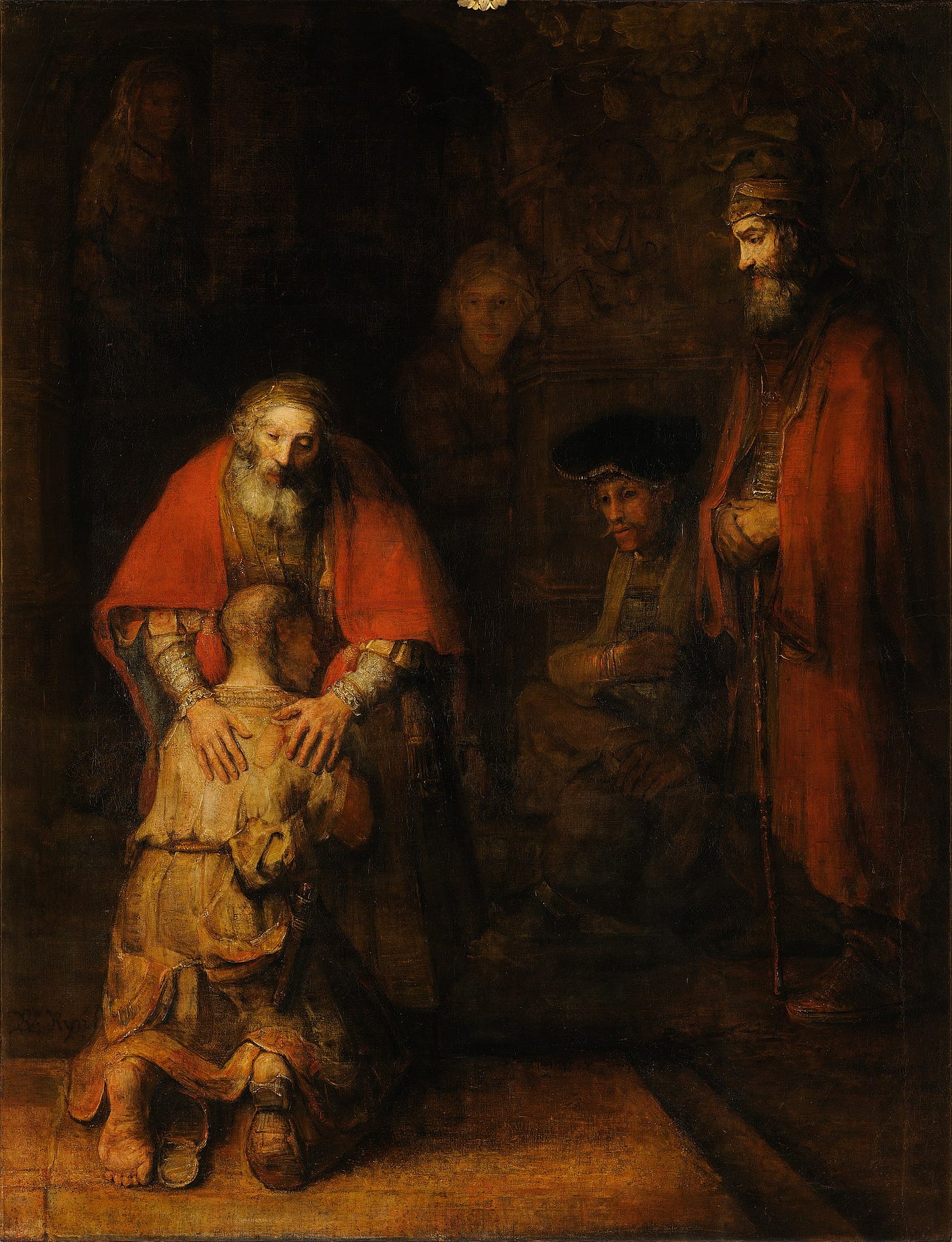Blessed are the Merciful
In his encyclical Dives in Misericordia (Rich in Mercy), Pope John Paul II presents a vision of mercy as the heart of Christian life. He reminds us that mercy is not a passive response but an active force that surpasses justice, restoring dignity and uniting hearts. It calls us to encounter one another with love, even in the face of failure and wrongdoing. Let us consider how Christ’s mercy meets us in our failures—like the Prodigal Son, Peter, and Paul—and how we, in turn, are called to share that mercy with others.
Mercy Restores Dignity and Unites the Heart
This week I have been reflecting on the encyclical Dives in Misericordia.
Mercy that is truly Christian is also, in a certain sense, the most perfect incarnation of "equality" between people, and therefore also the most perfect incarnation of justice as well, insofar as justice aims at the same result in its own sphere. […] mercy becomes an indispensable element for shaping mutual relationships between people, in a spirit of deepest respect for what is human, and in a spirit of mutual brotherhood. […] Let us remember […] that merciful love also means the cordial tenderness and sensitivity so eloquently spoken of in the parable of the prodigal son, and also in the parables of the lost sheep and the lost coin. […] merciful love is supremely indispensable between those who are closest to one another: between husbands and wives, between parents and children, between friends; and it is indispensable in education and in pastoral work.
§14 Dives in Misericordia, John Paul II
Pope John Paul II reminds us that mercy is the highest expression of justice, transforming relationships by restoring dignity and creating unity. While justice measures and balances, mercy goes further, meeting people where they are and inviting them into love. Mercy allows both the giver and the receiver to experience the profound mutual enrichment that only love can provide.
This truth is seen in the parable of the Prodigal Son (Luke 15:11-32). The son, having failed spectacularly to love his father, returns expecting only justice—a servant’s place in the household. Yet the father, rich in mercy, welcomes him not as a servant but as a beloved son, restoring his dignity and drawing him into the fullness of familial love. In this way, the father mirrors Christ, who stands ready to welcome us back when we fail to love as we should.
Transformed by Mercy
We see this mercy also in Peter and Paul. Peter, who denies Christ in fear and weakness, is met with no rebuke but a question that pierces his heart: "Do you love me?" (John 21:15-17). In this moment, Christ’s mercy transforms Peter’s failure into a call to feed His sheep. Similarly, Paul, blinded on the road to Damascus, confronts his hateful persecution of Christians. Yet Christ, rather than exacting justice, asks, "Why are you persecuting me?" (Acts 9:4), and offers Paul not only forgiveness but a mission to proclaim the Gospel to the nations.
Let us Examine Our Own Hearts
These stories invite us to examine our own hearts, where we often find failures to love: the grudges we hold, the unkindness we show, and the mercy we withhold. Like the Prodigal Son, we may squander the gifts we’ve been given; like Peter, we may deny Christ through our actions; and like Paul, we may wound others with our words or deeds. Yet Christ stands ready to pour out His mercy, always waiting to heal us and draw us back into His love.
Receiving this mercy is not the end—it is the beginning. Just as Christ has shown us mercy despite our failures, we are called to extend that mercy to others, even to those who have wronged us. God knows how often we have wronged others, yet He forgives us. How, then, can we withhold forgiveness from our neighbor?
Mercy does not excuse wrongdoing; rather, it transforms it. When we allow God’s mercy to heal us, we are freed to share that same mercy with others, becoming instruments of His love and reconciliation. In a world often content with justice, mercy reminds us of the greater call: to love as Christ has loved us. Let us, then, run to Him, receive His mercy, and become agents of that mercy for those around us.
Thank you for reading The Call to Holiness. This post is public so feel free to share it.



